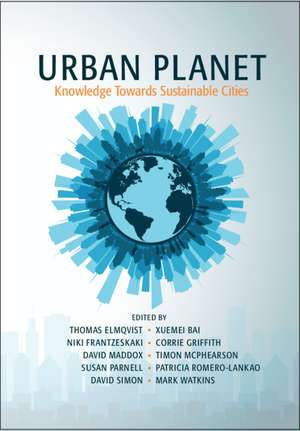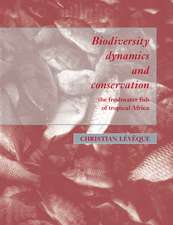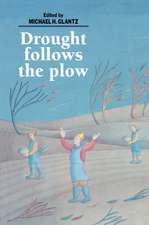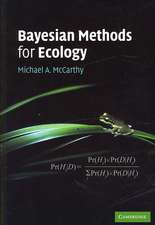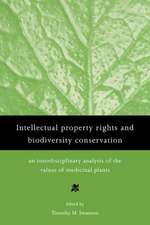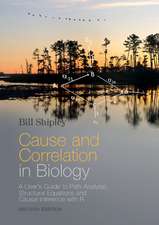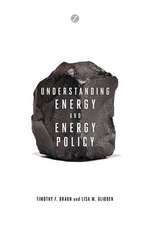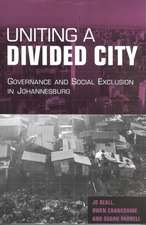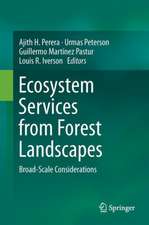Urban Planet: Knowledge towards Sustainable Cities
Editat de Thomas Elmqvist, Xuemei Bai, Niki Frantzeskaki, Corrie Griffith, David Maddox, Timon McPhearson, Susan Parnell, Patricia Romero-Lankao, David Simon, Mark Watkinsen Limba Engleză Hardback – 25 apr 2018
Preț: 494.99 lei
Preț vechi: 556.16 lei
-11% Nou
Puncte Express: 742
Preț estimativ în valută:
94.71€ • 98.90$ • 78.21£
94.71€ • 98.90$ • 78.21£
Carte tipărită la comandă
Livrare economică 15-29 aprilie
Preluare comenzi: 021 569.72.76
Specificații
ISBN-13: 9781107196933
ISBN-10: 1107196930
Pagini: 514
Ilustrații: 3 b/w illus. 65 colour illus. 8 tables
Dimensiuni: 180 x 253 x 34 mm
Greutate: 1.01 kg
Editura: Cambridge University Press
Colecția Cambridge University Press
Locul publicării:New York, United States
ISBN-10: 1107196930
Pagini: 514
Ilustrații: 3 b/w illus. 65 colour illus. 8 tables
Dimensiuni: 180 x 253 x 34 mm
Greutate: 1.01 kg
Editura: Cambridge University Press
Colecția Cambridge University Press
Locul publicării:New York, United States
Cuprins
Introduction; Part I. Dynamic Urban Planet: 1. Global urbanization: perspectives and trends; 2. Embracing urban complexity; 3. Understanding, implementing, and tracking urban metabolism is key to urban futures; 4. Live with risk while reducing vulnerability; 5. Harness urban complexity for health and wellbeing; 6. Macro-economy and urban productivity; Part II. Global Urban Sustainable Development: 7. Rethinking urban sustainability and resilience; 8. Indicators for measuring urban sustainable development and resilience; 9. The UN, the urban sustainable development goal and the new urban agenda; 10. Utilizing urban living laboratories for social innovation; 11. Can big data make a difference for urban management?; 12. Collaborative and equitable urban citizen science; Part III. Urban Transformations to Sustainability: 13. Sustainability transformation emerging from better governance; 14. To transform cities, support civil society; 15. Governance and the new politics of collaboration and contestation; 16. Seeds of the future, found in the present; Part IV. Provocations from Practice: 17. Sustainability, Karachi, and other irreconcilables; 18. What knowledge do the cities themselves need?; 19. Banksy and the biologist: redrawing the twenty-first century city; 20. Every community needs a forest of imagination; 21. How can we shift from a imaged-based city to a life-based city?; 22. A chimera called smart cities; 23. Beyond fill-in-the-blank cities; 24. Persuading policy makers to implement sustainable city plans; 25. To live or not to live: urbanisation and the knowledge worker; 26. City fragmentation and the commons; 27. Cities as global organisms; 28. From concrete structures to green diversity: ecological landscape design for restoring urban nature and children's play; 29. Building cities: a view from India; 30. The barking dog syndrome; 31. Overcoming inertia and reinventing 'retreat'; 32. Money for old rope; 33. An aesthetic appreciation of tagging; 34. Understanding Arab cities; 35. Who can implement the sustainable development goals?; 36. Achieving sustainable cities by focusing on urban underserved; 37. The rebellion of memory; 38. Cities don't need 'big' data – they need innovations that connect to the local; 39. Digital urbanisation and the end of big cities; 40. The art of engagement / activating curiosity; 41. Nairobi's illegal city makers; 42. Active environmental citizens with receptive government officials can enact change; 43. The sea wall; 44. Academics and non-academics: who's who in changing the culture of knowledge creation?; 45. Private fears in public spaces; 46. Leadership: science and policy as uncomfortable bedfellows; 47. Sketches of an emotional geography towards a new citizenship; 48. The shift in urban technology innovation; 49. Greening cities: our pressing moral imperative; 50. Recognition deficit and struggle for unifying city fragments; 51. Disrespecting the knowledge of place; 52. Broadening our vision to find a new eco-spiritual way of living.
Recenzii
'The fast-paced urbanization of the world significantly alters our attitudes towards space, particularly the ways we comprehend and organize them. This development is unprecedented in our recent history and calls for global reflections aiming at enlightening and supporting the implementation of local policies. Such is the ambition of Urban Planet book. To overcome the major challenges we are facing - particularly the ones dealing with climate and resilience - cities, such as Paris and many other cities around the globe, must understand and embrace their own complexity, so as to harness complexity to better serve the well-being of their citizens. It is by empowering the collective intelligence and sharing knowledge, that our cities will reinvent ways of living together, grounded in inclusiveness and the daily practice of democracy.' Anne Hidalgo, Mayor of Paris
'The authors of Urban Planet make [the] journey to the city more legible, highlighting the hopes and hindrances its brings, and the need for a parallel evolution of our science and systems if we are to reap the rewards of the great urban trek that we are now on.' Greg Clark, CBE, Urban Innovation Centre, London
'The authors of Urban Planet make [the] journey to the city more legible, highlighting the hopes and hindrances its brings, and the need for a parallel evolution of our science and systems if we are to reap the rewards of the great urban trek that we are now on.' Greg Clark, CBE, Urban Innovation Centre, London
Descriere
Over 100 scientists, architects, journalists, artists and activists address creatively the unprecedented challenges facing an Urban Planet. This title is also available Open Access.
